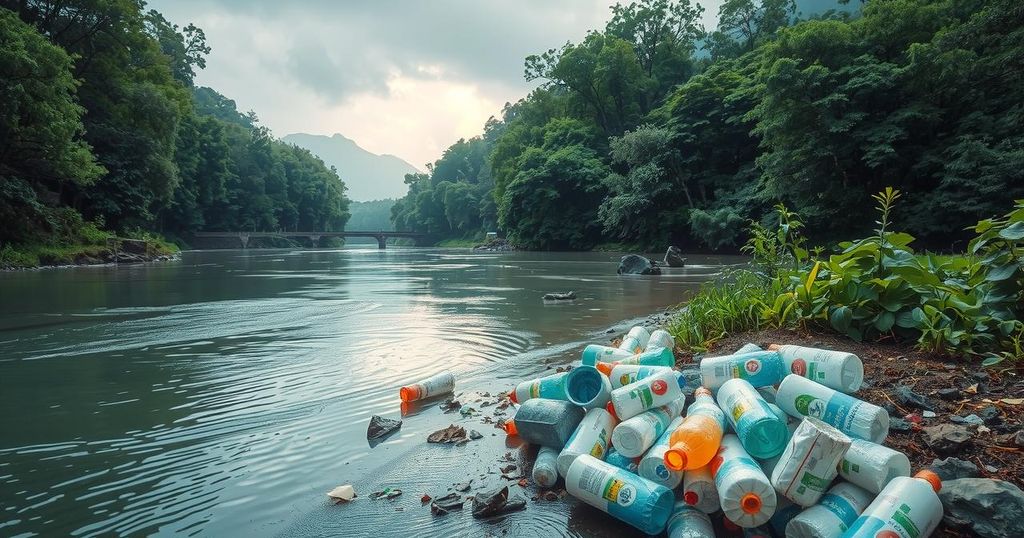Zimbabwe’s Ongoing Struggles with Illegal Chinese Plastics
Zimbabwe’s Mbare marketplace is inundated with illegal plastic bags below the legal thickness, primarily imported from China. Vendors acknowledge the bags do not meet standards due to high demand for cheaper options. Environmental consequences include severe waste management issues and harm to local wildlife, prompting calls for stricter enforcement of existing regulations.
At Mbare marketplace in Zimbabwe, the presence of plastic bags is ubiquitous, with vendors supplying these items primarily imported from China or produced by local Chinese firms. These plastic bags frequently fall short of Zimbabwe’s legal standards for thickness. “We know this type of plastic isn’t allowed, but we sell it anyway. It’s cheaper, and there is a huge demand for it in the market,” said Tichaona, a local vendor.
Many buyers remain unaware that the bags they purchase are thinner than permitted. An employee from Colour Maximal, a Chinese-owned plastic manufacturing company, disclosed, “Customers are told these plastics meet the 30-micron requirement, but that’s simply not true.” Zimbabwean legislation prohibits the production or sale of plastic packaging thinner than 30 microns, with specific exceptions.
Despite the regulatory framework, the influx of inexpensive plastic imports from China has intensified, alongside the rise of Chinese manufacturing entities. These businesses often exploit lax law enforcement, perpetuating a plastic pollution crisis. “[They] don’t care about quality. Their products are cheaper. People can just walk in and buy in bulk,” remarked Donald Marumbwe, a veteran in the plastic manufacturing industry.
Independent tests conducted by Global Press Journal revealed that samples from Colour Maximal failed thickness regulations. Some bags measured as thin as 20 microns, while bread packaging was found to be as slim as 6 microns. This type of plastic, used predominantly once, has a decomposition time of thousands of years, transforming into harmful microplastics that can contaminate ecosystems.
Tatenda Murwira, a manager at Colour Maximal, acknowledged their focus on profit. “We’re profit-oriented. It’s all about saving materials and keeping prices competitive,” he stated. Unfortunately, Zimbabweans face the repercussions of this negligence; approximately 18% of the country’s plastic waste is improperly disposed of, contributing to severe environmental consequences.
Zimbabwe’s Environmental Management Agency undertakes routine inspections to curtail non-compliant plastic manufacturing and distribution. Violators risk fines up to 500 United States dollars. However, Murwira contended that despite inspections from authorities, no check on product quality ever occurred at his facility.
Tracing the source of problematic packaging is challenging once it enters the market. “[The companies] don’t put their names on the packages because they don’t want it traced back to them,” Marumbwe noted. Remarkably, no manufacturer names appeared on any plastic bags analyzed from the marketplace.
While South Africa has historically supplied materials for plastic production in Zimbabwe, imports from China have surged, rising from 10.9 million dollars in 2012 to 54.8 million dollars by 2023, according to Trade Economics. China’s expanding influence in Zimbabwe’s economy has resulted from long-standing relations fostered during former President Robert Mugabe’s tenure.
Professor Gift Mugano of the Durban University of Technology criticized the collaboration between Chinese enterprises and government officials. “They are in bed with the politicians. [The] Chinese work with people in high offices, so they’re kind of covered, and they don’t respect the environmental laws,” he asserted, referring to a broader pattern in Africa.
Zimbabwe has implemented measures to address its plastic problem, including a tax on plastic bags initiated in January. However, companies often evade this tax, mirroring their disregard for existing regulations. An employee at Colour Maximal reported threats from tax authorities over non-payment.
Finally, Global Press Journal visited another factory, formally registered as Liwei Wang, also producing substandard plastic bags. The employees admitted their packaging measured only 20 microns, below the legal requirement, and displayed expired tax documentation.
Zimbabwe is grappling with a significant environmental challenge posed by the proliferation of illegal, thin plastic imports from China and local manufacturers. Despite legal measures and inspections, compliance remains inadequate, as profit motives overshadow environmental obligations. The entire industry faces scrutiny over the failure to meet established standards, endangering both public health and the environment, necessitating urgent regulatory reforms.
Original Source: www.newsday.co.zw




Post Comment